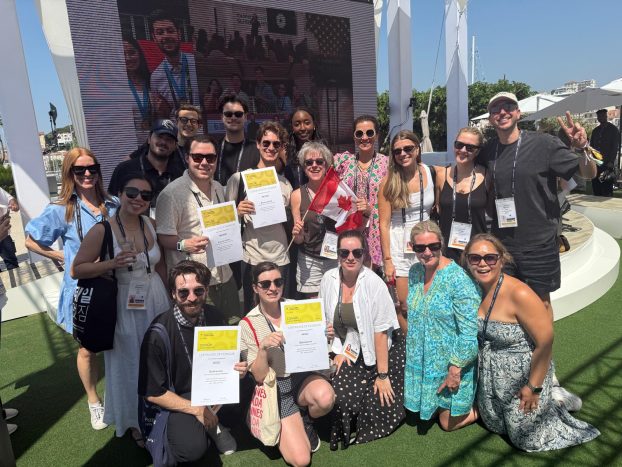In a bid to broaden its market beyond Web-heads, The Peachtree Network, an online grocery portal that operates in 16 markets across Canada and the U.S., will spend $800,000 in the year ahead to build its brand.
Flush with cash from its recent initial public offering, the Montreal-based company (www.peachtreenetwork.com) is ramping up its promotional strategy and will spend at least $400,000 on a national branding campaign to launch in April.
‘There are new customers coming online, times are changing and we’re after growth,’ explains Robert MacKalski, Peachtree’s vice-president of marketing. ‘Obviously, we have the ability to start spending money in this way and we understand the consumer a lot more.’
Beginning in April, Peachtree will test three different direct mail and billboard approaches in the Vancouver market. The strategy, developed by Toronto’s Beakbane Marketing, will allow the cybergrocer to tweak the media mix and creative based on results on the West Coast before rolling the ads out nationally.
Peachtree is currently fine-tuning its strategies to reflect lessons learned from market research. The goal is to better understand who shops online and why, so that the company can grab a bigger chunk of Canada’s $55-billion grocery market.
‘Traditionally we segmented (the market) in three ways: busy people, people with mobility difficulties, and nerds,’ says MacKalski. ‘When we looked at the busy people, there are different reasons people are shopping online and we’re in the process right now of doing a lifestyle segmentation.’
That segmentation is telling the company, for instance, that people in Vancouver are more likely to try online shopping for positive reasons – like buying time to spend with their kids – than Torontonians, who want to avoid negatives, like dinged cars and long lineups. The company plans to adjust its advertising in each market to reflect these differences.
In recent months, Peachtree has been forging online marketing alliances as well, with Canadian Internet portals including Canada.com and Sympatico. Peachtree has an exclusivity agreement with Canada.com, making it the official online grocer of the Southam-owned Internet site and giving its logo exposure in the portal’s current national newspaper ads.
Once the darlings of the dot-com world, online grocers have been struggling to capture a significant offline customer base. Poor results have begun to plague American cybergrocers, most visibly with Peapod, whose troubles have prompted its directors to consider selling the company.
Obviously, Peachtree doesn’t want to meet the same fate, so it has been putting a heavier emphasis on customer research. It is also experimenting with new channels through which to get the attention of the elusive consumer.
Peachtree is testing cross-promotion waters in order to reach an offline audience. In a deal with Dish It Out, a cooking show on Life Network, the show’s featured recipes will be posted on Peachtree’s Web site. With the click of a mouse, the ingredients will be in a consumer’s virtual shopping cart.
The next year will also see Peachtree expanding rapidly, filling in Canadian market gaps like Calgary and launching in more American markets. Since launching first in Winnipeg in 1996, the company has partnered with local grocers in markets such as Toronto, Ottawa, Vancouver, Edmonton, Montreal and St. John’s, as well as Pittsburgh, Washington D.C., Chicago and Oklahoma City, to provide fulfillment.
Being first to market lies at the core of the company’s strategy, says MacKalski, who notes that a new partnership with upscale Toronto grocer Sun Valley Foods will allow the company to compete aggressively in the country’s largest market.
In Quebec, Sobeys-owned IGA has launched its own online system, called Cybermarket, which serves as the online option for 153 of the company’s stores. Cybermarket has focused on making its service an alternative distribution channel for existing IGA customers, says project leader Alain Dumas.
Cybermarket is promoted through various in-store devices, including leaflets, window stickers, and mentions in weekly advertising flyers. The company has also sent out a leaflet promoting its business-to-business Cybermarket service to more than 17,000 prospects in Quebec.
Cybermarket plans to refine its system in Quebec before rolling it out to IGA stores in Ontario and then to Sobeys in the Maritimes.
With no plans to expand geographically, Grocery Gateway, Peachtree’s most direct competitor, is focusing on ‘getting it right’ in Toronto. The company’s central fulfillment centre will allow it to better serve its customers and that, says John Moses, Grocery Gateway’s vice-president of marketing, will let the company grow.
In January, Grocery Gateway kicked off what was supposed to be a multi-million-dollar campaign designed by Toronto ad shop Garneau Wurstlin Philp Brand Engineering. However, Moses says consumer demand was so strong that the company pulled the plug after only five ads ran in The Toronto Star and The Toronto Sun newspapers for fear it couldn’t keep up with demand.
‘The consumer response was tremendous,’ says Moses. ‘We got as many registrations in two days in January as we did in the entire month of December.’




























